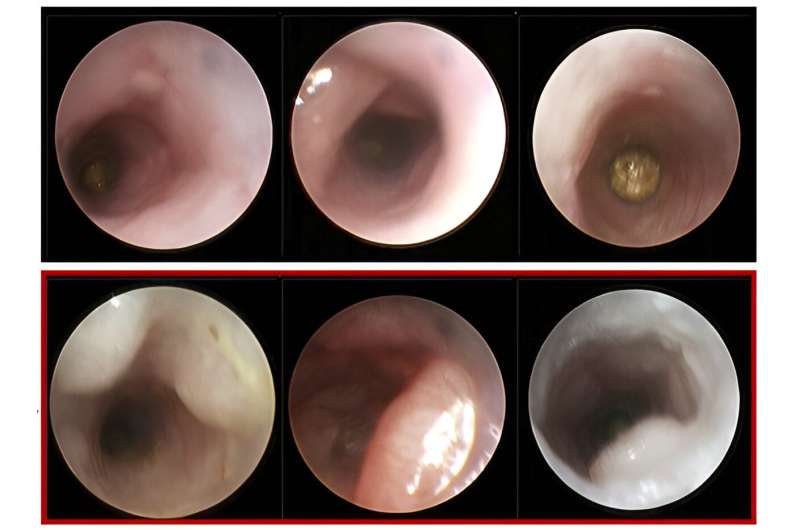This article has been reviewed according to Science X's editorial process and policies. Editors have highlighted the following attributes while ensuring the content's credibility:
fact-checked
peer-reviewed publication
trusted source
proofread
Scientists discover mutations in blood stem cells can exacerbate colon cancer

Researchers at the University of Florida College of Medicine have discovered how common age-related changes in the blood system can make certain colon cancers grow faster.
The study, to be published August 24 in the Journal of Experimental Medicine (JEM), also suggests how these effects might be therapeutically targeted to reduce tumor growth and improve patient survival.
As we age, the hematopoietic stem cells that reside in the bone marrow and give rise to all of the body's different blood cells gradually acquire mutations in their DNA. Most of these mutations have no effect, but some can enhance a particular stem cell's ability to survive and proliferate, resulting in large numbers of blood cells that carry the same mutation.
This phenomenon, known as clonal hematopoiesis, is seen in 10–20% of elderly people and is associated with an increased risk of developing blood cancers. But clonal hematopoiesis is even more frequently seen in patients with many other types of cancer outside of the blood system and is associated with faster tumor progression and shorter survival times.
"However, whether the presence of clonal hematopoiesis causes the aggressive phenotype of unrelated solid tumors has not been vigorously addressed," says Olga A. Guryanova, now an associate professor at the University of Florida College of Medicine and a member of the University of Florida Health Cancer Center, who led the new JEM study.
Guryanova and colleagues decided to investigate the role of clonal hematopoiesis in colitis-associated colon cancer (CAC). Inflammatory bowel disease, including ulcerative colitis and Crohn's disease, is a well-known risk factor for colon cancer, and clonal hematopoiesis is prevalent in both IBD and colon cancer patients.
The researchers generated mice with clonal hematopoiesis by transplanting them with blood stem cells lacking one copy of Dnmt3a, the most frequently mutated gene in clonal hematopoiesis patients. The mice were then treated with drugs that induce the development of CAC. Guryanova's team found that CAC occurred more frequently, and developed more rapidly, in mice with clonal hematopoiesis, resulting in larger tumors with a worse histopathology.
Guryanova and colleagues determined that one way clonal hematopoiesis promotes the development of CAC is by increasing the number of blood vessels that supply the intestinal tumors with the nutrients and oxygen they need to grow. Blocking the formation of these extra blood vessels with axitinib, a drug approved by the FDA to treat advanced kidney cancer, inhibited the growth of CAC tumors in mice with clonal hematopoiesis. In contrast, axitinib had little effect on the growth of CAC tumors in mice without clonal hematopoiesis.
"Our results show that alterations in Dnmt3a in bone marrow stem cells can have profound impact on the development of CAC through multiple mechanisms, some of which may be therapeutically targetable," Guryanova says. "Our findings, for the first time, solidify the causal relationship between clonal hematopoiesis and the severity of solid tumors and identify potential therapeutic strategies."
More information: Yang Feng et al, Hematopoietic-specific heterozygous loss of Dnmt3a exacerbates colitis-associated colon cancer, Journal of Experimental Medicine (2023). DOI: 10.1084/jem.20230011



















